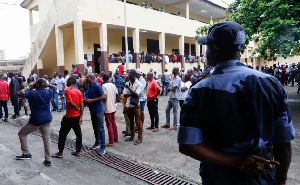(A GNA Feature)By Benjamin Mensah
Accra, May 13, GNA - The debate about fuel prices rages on. Whether Government reduces prices of petroleum products or not, travelling on the Barnes Road from the New Tema Station to the Kwame Nkrumah Circle is smooth.
The road is modern, first class. Whether in a rackety jalopy or a latest brand of automobile, motorists, passengers and pedestrians bless the trees and buildings that tower and chaperon the boulevard. Leaving the Station that serves more than 35 destinations with the more than 700 vehicles that enter the Station daily may be quite refreshing since the place is congested. The Station bursts at its seams with travellers, buyers and sellers, adult and under-aged street porters (kayayei).
Migrants without the wherewithal to rent a room, drug peddlers and users, hustlers, pickpockets and immoral girls and women convert the concrete islands into bedrooms and brothels in the evening. The islands, which are horizontal rather than slanted in shape, add up to the congestion.
In the midst of an ineffective electrical system in the supposedly ultra modern lorry park, one also heaves a sigh and says a momentary good-bye to the stench from grimy, choked gutters, converted into latrines by the illegal "residents", despite the presence of four modern and large-sized water closet facilities.
The regular sights of large volumes of refuse at the main eastern entrance and another outlet behind the National Hockey Pitch perhaps complement the nauseating stench that emanates from gutters around the station.
When disease-bearing flies congregate on the garbage piles at the Station, they hum and buzz to provide bon a petit to commuters having their meals in the eateries.
But while spittle may swing from disapproving mouths towards the rubbish piles, a Rasta-haired naked man would grin at his "pantry". He would pass for a runaway intern from the Accra Psychiatric Hospital, the Craze-House.
The good meals are perhaps conduits for the eaters to catch typhoid, whose agents linger in food that may be contaminated with human excreta in the various eateries at the Station.
A public address system would not be out of place for a "who is who" in the production of high pitch decibels. The contenders would be the flies, cassette vendors; sellers calling for buyers, commuters and the peripatetic Pastors, who preach everything; chiefly the prosperity gospel, minus the message on 'cleanliness is next to godliness'.
So exiting from the Station, through one of the Southern gates, one first faces the fence wall of the Head Office of the Department of National Lotteries and the Human Resources Development Division of the Ministry of Health, which faces the main gate to the National Hockey Pitch.
A turn to the right and you are on the Barnes Road, very major but less noticeable. As the vehicle moves on, one sees the Rex Cinema, a reminder of the era of the big screen.
Ten thousand cedis at a sitting for a film in the Cinema are rather on the high side for the average Ghanaian. She or he would rather forgo Rex for a 1,000-cedi video show, a phenomenon that has sounded the death knell of big screen.
A move from Rex and you are at the Accra East Office of the Electricity Company of Ghana (ECG), the Electricity House to pay your bills, dispute an unwarranted bill or to invite the fieldsmen to reconnect your electricity lines.
See the park and thoroughfare after the ECG beaming with smiles and thanking the Accra Metropolitan Authority for decongesting it and trying to rejuvenate it.
Young men and women after a hard day's work sit or crouch on the railings that fence the park which looks like an island. Other balustrade embankments nestle the park in the crossroads to Tudu, Makola, the National Theatre and the Old Parliament House. It is also here that the trip on the Barnes Road takes a turn through the Independence Avenue, meets a traffic light, and later makes a swerve to rejoin the Barnes Road in front of the plush Novotel Hotel. The scrubby but once lush and first class Kinbu Gardens overlooks the vintage 1924 PWD Building. Kinbu Gardens was hardly missed out in hosting social gatherings in days gone by.
A not belligerent traffic lights nearby, leading to Kinbu Secondary Technical School has been tolerant to pedestrians, and motorists, and other commuters; and truant pupils sporting the black and navy blue combination uniform from the School, who jump red lights with impunity. The school, which used to be Kinbu Junior Secondary School, one of the first Junior Secondary Schools on experimental basis, was upgraded following the educational reforms in 1980s.
A further move from the Kinbu Secondary Technical School, and you are in a yard that houses the offices of the Technical Exams Unit of the Ghana Education Service, the Greater Accra Regional Office of Births and Deaths Registry, Office of the Ghana Diplomatic Missions (Payments) Examinations, and the Pensions Payments Office, where a great number of once young and hardworking, but now old workers of Ghana on "pay days" wait despondently in the dishevelled yard for their paltry pension stipends.
A move from the Kinbu Gardens involves risk. Times were when petty criminals, posing as ECOWAS travellers in transit, with fake travelling documents and fake "lotto" numbers would accost an unsuspecting pedestrian asking him or her for direction to a nearby location. At the end of the encounter, the supposed ECOWAS traveller, who claimed to have lost his way, would have swindled the Good Samaritan. An alley between the Kinbu Gardens and the Kinbu Park is not only a red light district, but also a den of other illicit activities. With the current decongestion exercise of the Accra Metropolitan Assembly (AMA), the foodstuff sellers that harangued pedestrians have moved to the Kinbu Park, which also shares a lorry park to vehicles destined for some towns before and beyond the Volta River: Kwamikrom, Akosombo, Kpando, Tapa Abotoase, Donkorkrom and the Afram Plains. The glow of bobo lights, which burn from wicks and kerosene in used Milo tins, project silhouettes of excited buyers and sellers in the grey dark park, now serving as market at dusk creates a perfect scene for a documentary on an African market.
In the late afternoons football lovers go to the Park, either to watch or play, breaking sweat in pursuit of an inflated leather case.
A prohibitive pocket may prevent a commuter from entering to savour the cuisines and delicacies of the plush and French biased Novotel Hotel, next to the Park, and "right in the heart of the city of Accra." The commuter would, however, at least be able to go into the Assembly Press opposite to the Novotel and pick a copy of Ghana's current Constitution or older ones as well as important laws and Acts of the Land.
Just after this are the tall buildings of Accra Polytechnic, Ghana's premier polytechnic. From the vantage point of the Assembly Press one could take a long distance photographic shot of the ruins of the once plush Ambassador Hotel, now reminiscent of the ruins of Athenian acropolis.
Overlooking the Accra Polytechnic is a big yard in front of the Hall of Trade Unions. Look out for shoe sellers, and the lotto kiosks and the lotto "professors" before getting to the Hall.
A wrangle rages on between the Trades Union Congress (TUC) and the Industrial and Commercial Workers Union (ICU) on if the seceded ICU had a right to occupy that building Osagyefo Dr Kwame Nkrumah, First President of the Republic of Ghana bequeathed.
Crossing the street after the traffic lights, look on the right and you would find the Standard Chartered Bank facing the Museum of Science and Technology, which has been taken over by basket weavers and squatters.
Drive on and in about 10 seconds you reach the junction of the Accra City Campus of the University of Ghana, formerly called Workers College, which faces the Millicom House, home of the "Megyina Abonten", perhaps Ghana's first cell phone network.
As you look at the left, you find the annex of the Headquarters of the Ghana Audit Service, whose yard also houses the Greater Accra Regional Office of the National Service Secretariat, and the Greater Accra Regional Co-ordinating Council.
A further move, and you are at the National Museum facing the Adabraka Calvary Methodist Church.
The Calvary Methodist Church is where on Sundays one sees some of the most beautiful and expensive automobiles in modern and post-HIPC (Highly Indebted Poor Countries) Ghana.
Is it true that the Adabraka Calvary Methodist Church is where the most influential, and richest among the Methodist faith in Accra worship God? Mind you anyone who wants to travel outside the country would have to go a few yards away from these Church buildings and get some jabs at the
International Vaccination Centre at the Adabraka Polyclinic. And after the Calvary Methodist Church is the Accra Rehabilitation Centre, where the inmates have shown really that disability is not inability. You would find beautiful woven material and works of art and craft at relatively more affordable price at the Centre, which need more attention from the Employment and Social Welfare agencies. Please, don't look to the left, else you'll find the overgrown bushes on top of a supposedly storey-building that shield the Young Women Christian Association and the Public Records and Archives Department.
You are at a T-Junction and a turn to the right on the first class road to the Ridge Hospital. Look behind the road and you would find the walls, shielded by structures of food vendors.
Yes, you are at the Psychiatric Hospital, which Prof Ayi Kwei Armah in his political satire of post independent Ghana, the "Fragments", called the Craze-House.
This Craze-House is where Ghana's celebrated film director Ekow Ansah, shot the last scene in his award winning "Love Brewed in African Pot."
A form of "royal household", there are 1,300 inmates in this "Castle" and a third of them have reigned, been on admission for about 30 years.
Ms Ethel Lartey, Deputy Director of Nursing, said the Hospital authorities have had difficulties tracking the relations of these patients, because most of the addresses were wrong. Although most of the patients have been treated of their illnesses, in some cases the patients' relatives have refused to visit them or to accept them back into their homes.
Because of stigmatisation associated with mental illness, even the few patients, who could have been discharged to live with their relatives and friends or in the community, have been reluctant to leave the hospital.
The result is that the patients continued to be a burden on the hospital budget, but Ms Lartey added that the Government had been very supportive of the Psychiatric Hospital in its current circumstances by providing funding for the drugs needed to treat patients. A lot more, however, needs to be done, since the hospital relied increasingly on charitable and benevolent organizations to meet it operational cost.
Also currently, the Nurse-Patient ratio is 1:130, against the recommended ratio of 1:4. This is because of the constant resignation of nurses from the Psychiatric Hospital due to the unbearable pressures of work
Entertainment facilities like ludo, television sets, and volleyball sets needed in the rehabilitation of the inmates are lacking but they appeared not to be bothered they welcome visitors happily to their rooms.
So why not make a stop over at the Psychiatric Hospital, when travelling from Tema station on the Barnes Road to the Kwame Nkrumah Circle to visit our poor brothers and sisters, and contribute your widow's mite to put smiles on their faces?
Some missed cupid's arrow while others just blew up trying to think the unthinkable or doing that which must not be done. The Craze-House is full of tales that may never be told.
Opinions of Friday, 13 May 2005
Columnist: GNA














